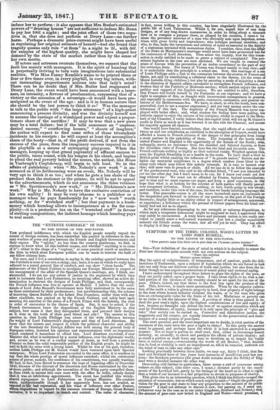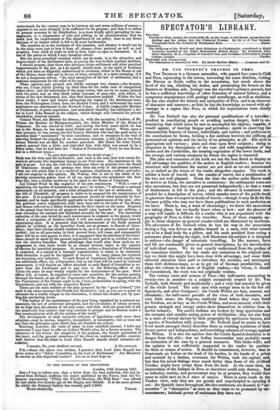SYMPTOMS OF THE TIMES: COLONEL WOOD'S LETTER TO LORD JOHN
RUSSELL.
TO THE EDITOR OF THE SPECTATOR.
"Etre paurre sans etre fibre eat le ptre etat on l'homme poisse tomber."
nousszao.
Sin—Your definition of the state of mind in which it is desirable to renew the Poor-law discussion quite accords with my own notions on the subject.
"None ego mitlbus
21Intare QUIESO trIstla."
May the spirit of enlightenment, of temperance, and of candour, guide the deli- berations of Parliament, upon a subject of legislation which we are forced to look into not only from our inherent notions of truth and justice, but also from the in-
ferior though no less cogent considerations of sound policy and national safety.I have endeavoured throughout these letters to place the rights of the poor, as they are justly called, upon a proper basis. I take those rights to be, that a cer- tain portion of the incomes of the wealthy should be set apart for the use of the
poor. Others, indeed, say that theirs is the first lien upon the produce of the soil. This, however, is much more questionable. When by the superior cultiva- tion of the earth a value is given to property in land, that property of right belongs to the man whose honest industry reclaims the waste, or to the man who gives
him an exchangeable value for the fruits of his toil. Misfortune or poverty can be no claim to rob the labourer of this. A portion of what is thus gained is in- deed the poor man's right, upon the highest considerations of law and equity: of
law, because no foresight can defend the best of us against casualties which are sent by Providence; of equity, because it is only upon the principle of "give and take" that society can be carried on. Corrective and distributive justice, the magistrate and the senator, are equally interested in the preservation and main- tenance of a sound system of poor-laws.
The next question, and the most important one to decide, is what portion of the resources of the state have the poor a right to claim ? To this query the answer
must be general, and perhaps upon the whole it is best answered us a negative manner. Not so large a portion as shall tend, first, either to discourage honest industry, or, secondly, to check and paralyze the efforts of private charity : not so small a portion as shall leave any man so destitute as to impair his bodily force or mental energy,—remembering the words of old Hooker, "that destitu- tion in food or clothing is such an impediment as, till it be removed, suffereth not the mind of man to take any other care." Looking practically between these limits, we may say, fairly I think, that Ire- land and Scotland have of late years been instances of insufficient poor-law aye terns: the Southern provinces (for great doubt remains about the North) of Eng- land were a decided instance the other way.
Descending still further to particulars, there seems a sort of consensus among writers on this subject, (the elder ones, I mean) dictated partly by the enact- ments of the Levitical law, partly by the feelings of the heart as to what is right, that a tenth of our incomes is a fair proportion to devote to purposes of eliFtcr.
This gives rise to an interesting question, which I think has hitherto esea tbe attention of economists, but on which much might be said—" Ought the pub lc pro- vision for the poor in any state to bear any proportion to the amount of its public revenue ?" I shall not attempt to discuss It now, but passing on, I must say, (whatever may be the case as to our sister kingdoms, Scotland and Ireland) that the amount of -rate now levied in England and Wales—which promises, I
understand, for the current year to be between six and seven millions of money— appears to me most strongly, to be sufficient for its purpose; and that it is rather
to greater economy in its distribution, to a more kindly spirit pervading its ma- nagement, to a suppression of jobs and jobbing in its administration, that we must look for improvement in this department of our polity, than to any direct increase of an impost which is felt to be most burdensome.
The question as to the incidence of this taxation, and whether it would not be in the main more just to levy it from all classes—from personal as well as real property, from stock in trade as well as from land—is open to discussion. It is one of the points to which bossy hereafter advert. But the great practical economy which can be made, is in the alteration and improvement of our Settleinent-laws, as paving the way to their gradual abolition. I should propose, that those who advocate union settlement and other practical improvements of the law, as I do myself, should meet, in the spirit of kindness which you have so diligently endeavoured to inculcate, either in the House or out of the House, those who are in favour of what, certainly, is a more sweeping, if it be not a dangerous reform, "the total abrogation of the law of settlement, and a national assessment for the relief of the poor."
These opinions gain ground, and chiefly amongst two classes,—the farmers,
who are, I hope, busily girding up, their loins for the noble race of competition before them; and the merchants of the large towns, who are by no means pleased with the great, and as they think unfair increase of poor-rate, with which, in virtue of the new Settlement Act, they find themselves saddled. Within the last three weeks, I have had letters advocating the repeal of the Settlement-laws, from the Walsingham Union, from the Basford Union, and I understand the same sentiments are entertained in the Norwich Union. A highly respectable Member of Parliament, of great experience, and undoubted sincerity, has addressed a let- ter to Lord John ft' ussell on the subject, which though only intended for private circulation, deserves remark.
Colonel Wood, the Member for Brecon, is, with the exception, I believe, of Mr.
Wynne the Member for Montgomeryshire, the oldest Member of the House of Commons. He was elected in 1806; and during the forty years which he has Sat in the House, he has made many friends and not one enemy. When, upon a late occasion, he was among the few COMA?, Members who had the good sense to sacrifice their" consistency" to their conscience, and to recognize in the wail of starving Ireland the exigency of an uncommon occasion, a bad joke or two from former friends was all that his conduct provoked. His friend Sir John Tyrell, indeed, quizzed him a little, and reminded him, with what was meant to be a sitter sneer, that he had been the "Nestor of Protection." Truly he was Nestor, but in a different sense- " To calm their passion with the words of age." Such was his duty and his inclination; and such is the man that now comes for- ward to advocate this important change in our Poor-laws. His experience of the poor is great. Let any one visit the workhouse where he presides over the Board of Guardians: though not perhaps free from the evils of the present system, every one will admit that it is a model of neatness, cleanliness, comfort, and order. I am not singular in this opinion. Mr. Wakley, who is not in the habit of be- stowing unmeaning praise, least of all too upon those who administer the New Poor-law, bore a emitter testimony in his place in the House of Commons.
Let Colonel Wood be the expositor of his own sentiments. "With a view of
equalizing the burden of maintaining the poor," he writes, "I advocate a national assessment on all property, and a total abrogation of the law of settlement. By the 43d of Elizabeth, all property is liable to be assessed for the maintenance of the poor. It is proposed that such assessment should be voted annually by Par- liament, and be made specifically applicable to the maintenance of the poor, after the previous year's expenditure shall have been laid on the table of the House, and thence referred to a Select Committee for their report on the same. Sixpence in the pound thus levied on all property would raise upwards of six millions, a sum exceeding the amount now disbursed annually for the poor. The immediate reduction of the sum levied for such maintenance to sixpence in the pound, would afford a mitigation of burdens which I will not waste your Lordships time by expatiating upon. It is proposed that the disbursement of the funds aaqessed should be confided, as the parochial funds are at present, to Boards of Guar- dians; that their election should continue to be, as it is at present, annual and pa- rochial; but as all poor-rates, in their present form, will cease, and consequently there will be no rate-payers to elect, it is suggested that the elections of the Guar- dians should be made by the persons registered in each parish as entitled to exer- cise the elective franchise. One advantage that would arise from such an ar- rangement is, that there would be an annual interest taken in the register of electors for parochial purposes. At present, unless a dissolution of Parliament is expected, or a county or a borough representation is about to be contested, little attention is paid to the register of electors. In many places the registers are becoming very defective. To each Board of Guardians there will require but one additional officer, viz. a Paymaster; but as the fund will be raised by national assessment, it will require an officer attached to each Board of Guardians to re- ceive from the Exchequer and to pay over to the Relieving-officer of the Union the sums he may weekly require for the maintenance of the poor. Such -officer will, of course, be required to enter into securities for the monies passing through his hands, as are all the Paymasters of the Army. The appointment of the Paymasters of the Unions ought to be ,_I have no hesitation in saying, with the Government., and not with the respective Boards." These are the main outlines of the plan proposed by the "good Colonel," (for such is his name amongst his friends and labourers); and, as you are so greet an advocate for a kindly temper in the discussion, I cannot but trouble you -by quo- ting his concluding words.
'The burden of the maintenance of the poor being equalized by a national as- sessment, the law of settlement abrogated, and the circulation of labour secured, let us hope that the alarms of all may cease; and that, with the good-will of all, our practically free country may long continue to prosper and to flourish under a free communication with all the nations of the world."
The development of such extensive schemes of legislation—still more their adoption—maybe unwise, impolitic inexpedient, or incomplete; but no man can say that the principles upon which ;hey are founded are unjust. Knowing, however, the value of space in your excellent journal, I defer any
comments I may have to offer on Colonel Wood's plan, for a future occasion. The character of the writer, the simplicity of his purpose, the honest patriotism of his heart, and the general soundness of his views on matters of public concern, well deserve that his letter to Lord John Russell should obtain extensive cir- culation.
I remain, Sir, your obedient servant, A GUARDIAN.
P.&—Since the above was written, I perceive that Lord John Hassell has given notice of a "Select Committee on the Law of Settlement." Are Ministers m earnest on this important matter? Let us at least hope so.



























 Previous page
Previous page